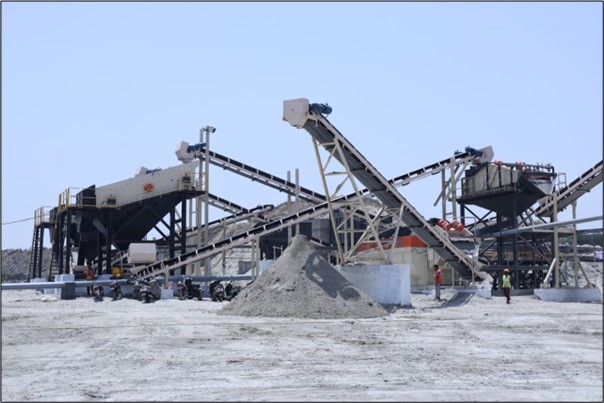By Bhabani Prasad Pati
Coal sector has long been the backbone of India’s economic growth and energy security. As the nation’s population continues to grow and access to electricity becomes more widespread, the coal sector remains a crucial source of energy. Despite a concerted push towards renewable energy, coal is projected to remain a prominent energy source. Estimates indicate that domestic coal production could surge by up to 1.5 billion tonnes by 2030, peaking around 2040.
India, while recognizing the urgent need to address climate change, is committed to a growth model that aligns with its “Panchamrit” goals of low carbon and environmentally friendly development. Striking a balance between climate considerations and economic realities, the nation has adopted a middle path, emphasizing “climate justice” to achieve a balanced growth model based on the principles of Common but Differentiated Responsibilities and Respective Capabilities (CBDR-RC). This approach involves exploring alternative uses for coal, such as coal gasification, to navigate the complexities of transitioning.
Renewable energy’s growth is predicted to have a less impact on the coal sector in India due to growing energy needs of the country. The total coal consumption in India is yet to peak and it is expected that coal demand will continue to rise and may peak around 2040. Although in the foreseeable future, some mines may close down due to exhaustion of reserves but also at the same time many new mega coal mines are being operationalized to meet the growing energy demand. These mines are not only ensuring affordability and energy security of the nation but also providing ample opportunities for new employment and redeployment of workers in new mines from to-be-closed mines to ensure better livelihood and also generate indirect employment opportunities in coal regions. Thus, there will be no immediate livelihood and social issues in both short and medium term i.e. for at least one business cycle. As such, the social, physical, and environmental aspects relating to the coal mines are adequately dealt with as per the provisions made in various existing statutes.
The closure of coal mines needs to be handled in a scientific and objective manner in order to ensure that the livelihoods of the impacted people are secured. In this regard, the idea of “Just Transition” was brought out in Paris Agreement, 2015. It refers to a just, fair and equitable transition for all stakeholders impacted by closure of coal mines which may happen and needs consideration. Just transition pathways aim to support infrastructure development, ecological restoration, capacity-building, and new livelihood opportunities in coal-dependent regions.
As the world unites to combat climate change and transition towards cleaner energy sources, the coal sector stands at the forefront of this transformation. However, such a shift must be accompanied by strategies that prioritize energy security, social equity, economic stability, and the well-being of affected communities. Drawing inspiration from various international models, best practices though it is very few and sporadic and implementing the Just Transition Principles in the coal sector have emerged, offering valuable lessons for nations undergoing similar transformations.
CMPDI conducted a study under the Ministry of Coal’s guidance, focusing on “Best Global Practices for Just Transition in the Coal Sector” as part of the ETWG of G20 Presidency of India’s Priority Area for achieving “Universal Access to Clean Energy and Just, Affordable, and Inclusive Energy Transition Pathways.” The study’s findings highlight key insights: rejuvenating depleted coal regions requires substantial technical and financial backing; effectively managing the social and labor challenges tied to coal mine closures in long term which thrives on multi-stakeholder policy shaping; investment in human capital, particularly in education and healthcare, holds importance; fostering local institutional capacity is vital for a favourable diversified business environment and coordinated economic development strategies and strategic resource allocation are crucial to mitigate the impact of mine closures. The effective Just Transition depends on building strong social partnerships and stakeholder engagement, early planning and diversification, retraining and reskilling, social safety nets, infrastructure and community development, supporting small and medium enterprises (SMEs), green finance and investment, and international collaboration.
Countries that depend on coal would need to plan and get ready for a gradual just transition plan in the coal sector whenever it is needed in the future. The roles and obligations of various stakeholders in relation to the technical and environmental closure of coal mines and obligations to support impacted individuals and communities may vary significantly across the globe in terms of just transition experience. Planning for Just Transition begins well before the closing of the mine, with inclusive engagement among a variety of stakeholders forming the vision for transition. Understanding the wider connections between coal and the local economy—where the social effects of closure are broadly dispersed across various segments of the labour force and communities. In order to adopt low carbon economic activities for the sustenance of coal dependent communities in coal regions, the G20 or developed countries may help the fair transition process in coal dependent countries by giving the necessary financial and technological assistance.
In conclusion, the transformation of the coal sector through a Just Transition is a complex endeavour that demands careful planning, collaboration, and compassion. By adopting best practices from around the world, coal dependent countries can pave the way for a more sustainable future that not only addresses climate change but also upholds the dignity and livelihoods of coal workers and communities. As the world evolves, these practices may serve as guiding beacons toward a balanced and equitable transition.

The author is Joint Secretary, Ministry of Coal
-PIB













